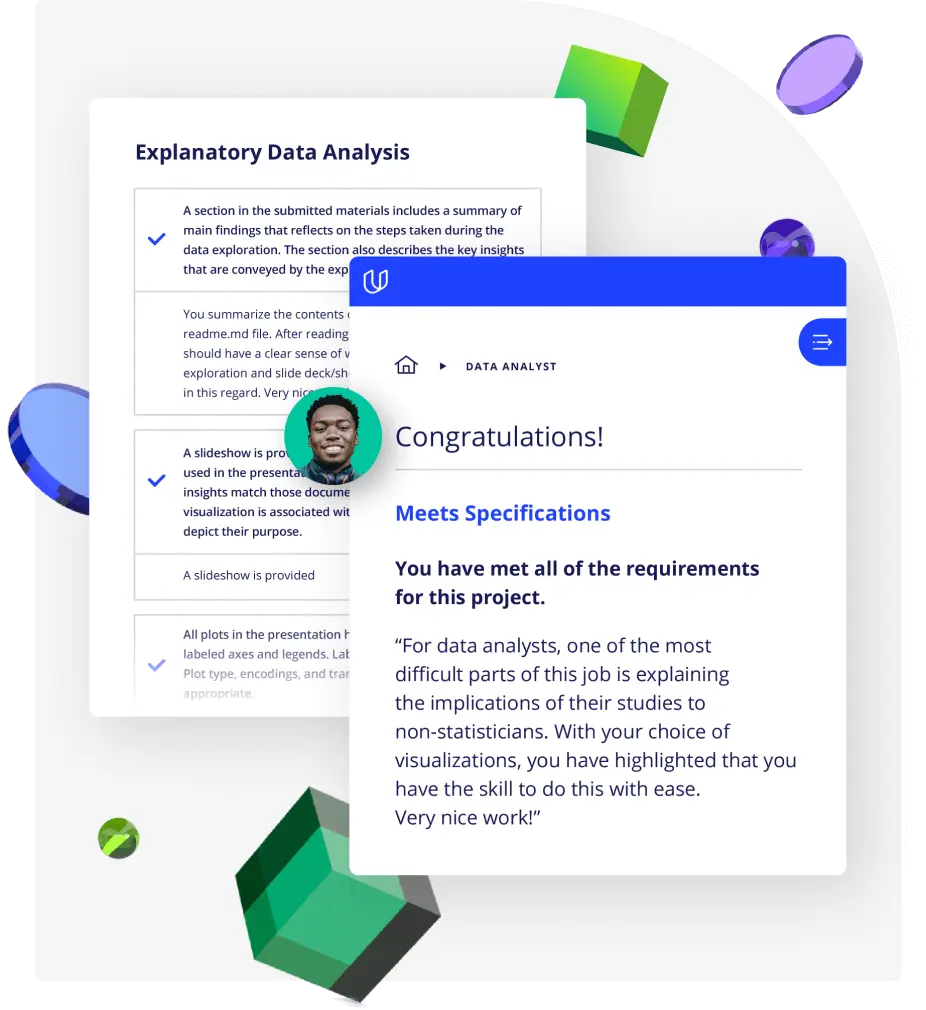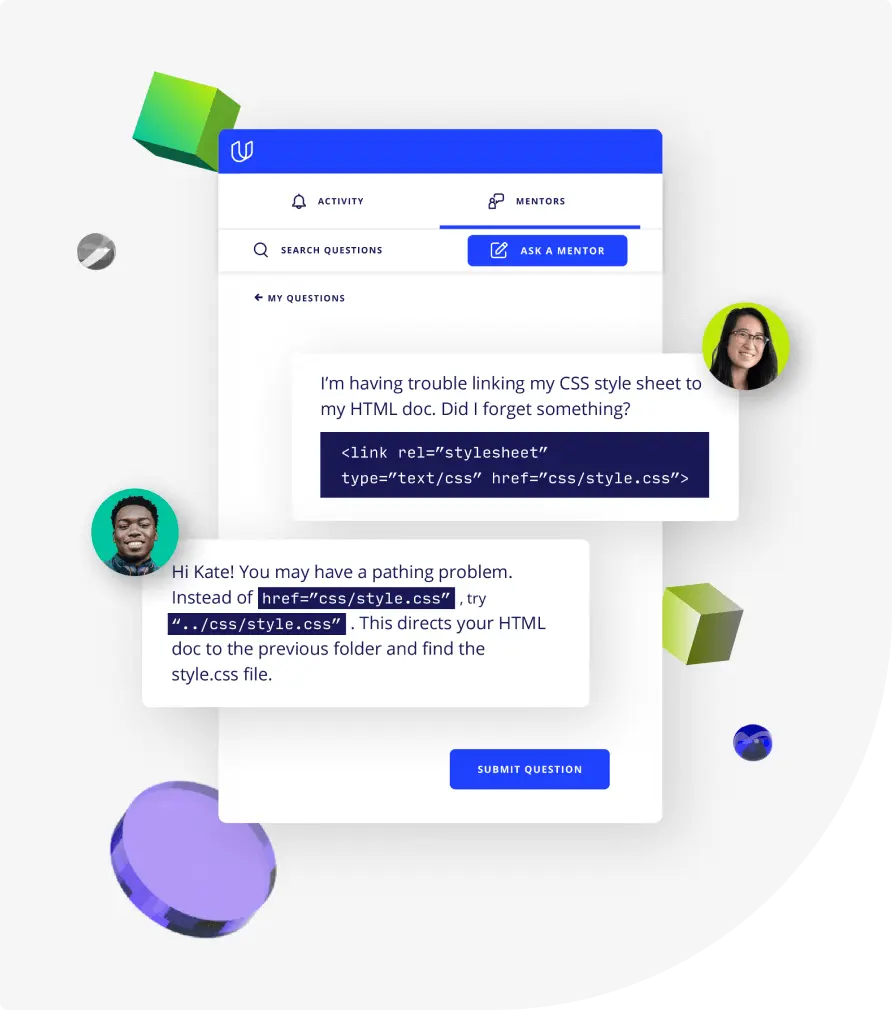Lesson 1
Welcome to the Course
This lesson will give you an overview of the course, discuss pre-requisites and stakeholders.

Course
Learn the data science process, including how to build effective data visualizations, and how to communicate with various stakeholders.
Learn the data science process, including how to build effective data visualizations, and how to communicate with various stakeholders.
Built in collaboration with
IBM
Advanced
3 weeks
Real-world Projects
Completion Certificate
Last Updated January 16, 2024
Skills you'll learn:
Prerequisites:
Lesson 1
This lesson will give you an overview of the course, discuss pre-requisites and stakeholders.
Lesson 2
In this lesson, you will learn about CRISP-DM and how you can apply it to many data science problems.
Lesson 3
In this lesson, you will be creating a post to communicate your findings via Medium.
Lesson 4 • Project
In this project, you will create a blog post and Github repository that you can use as you build your data science portfolio.

Staff Data Scientist
Josh has been sharing his passion for data for over a decade. He's used data science for work ranging from cancer research to process automation. He recently has found a passion for solving data science problems within marketplace companies.

Data Analyst Instructor
Mike is a content developer with a multidisciplinary academic background, including math, statistics, physics, and psychology. Previously, he worked on Udacity's Data Analyst Nanodegree program as a support lead.

Senior Data Engineer at Netflix
Judit is a Senior Data Engineer at Netflix. Formerly a Data Engineer at Split, where she worked on the statistical engine of their full-stack experimentation platform, she has also been an instructor at Insight Data Science, helping software engineers and academic coders transition to DE roles.

VP of Engineering at Insight
David is VP of Engineering at Insight where he enjoys breaking down difficult concepts and helping others learn data engineering. David has a PhD in Physics from UC Riverside.

Instructor
Andrew has an engineering degree from Yale, and has used his data science skills to build a jewelry business from the ground up. He has additionally created courses for Udacity's Self-Driving Car Engineer Nanodegree program.

Curriculum Lead at Udacity
Juno is the curriculum lead for the School of Data Science. She has been sharing her passion for data and teaching, building several courses at Udacity. As a data scientist, she built recommendation engines, computer vision and NLP models, and tools to analyze user behavior.

Instructor
Luis was formerly a Machine Learning Engineer at Google. He holds a PhD in mathematics from the University of Michigan, and a Postdoctoral Fellowship at the University of Quebec at Montreal.
Combine technology training for employees with industry experts, mentors, and projects, for critical thinking that pushes innovation. Our proven upskilling system goes after success—relentlessly.

Demonstrate proficiency with practical projects
Projects are based on real-world scenarios and challenges, allowing you to apply the skills you learn to practical situations, while giving you real hands-on experience.
Gain proven experience
Retain knowledge longer
Apply new skills immediately

Top-tier services to ensure learner success
Reviewers provide timely and constructive feedback on your project submissions, highlighting areas of improvement and offering practical tips to enhance your work.
Get help from subject matter experts
Learn industry best practices
Gain valuable insights and improve your skills

Unlimited access to our top-rated courses
Real-world projects
Personalized project reviews
Program certificates
Proven career outcomes
Full Catalog Access
One subscription opens up this course and our entire catalog of projects and skills.
Average time to complete a Nanodegree program
3 weeks
, Beginner
3 months
, Beginner
(807)
2 months
, Beginner
4 weeks
, Beginner
(781)
4 months
, Advanced
1 month
, Advanced
4 weeks
, Beginner
1 hour
, Discovery
(1194)
2 months
, Beginner
3 weeks
, Intermediate
(47)
2 months
, Beginner
(124)
5 months
, Beginner
(65)
4 weeks
, Intermediate
4 weeks
, Intermediate
3 weeks
, Beginner
(272)
2 months
, Intermediate

Introduction to Data Science
3 weeks
, Beginner
3 months
, Beginner
(807)
2 months
, Beginner
4 weeks
, Beginner
(781)
4 months
, Advanced
1 month
, Advanced
4 weeks
, Beginner
1 hour
, Discovery
(1194)
2 months
, Beginner
3 weeks
, Intermediate
(47)
2 months
, Beginner
(124)
5 months
, Beginner
(65)
4 weeks
, Intermediate
4 weeks
, Intermediate
3 weeks
, Beginner
(272)
2 months
, Intermediate